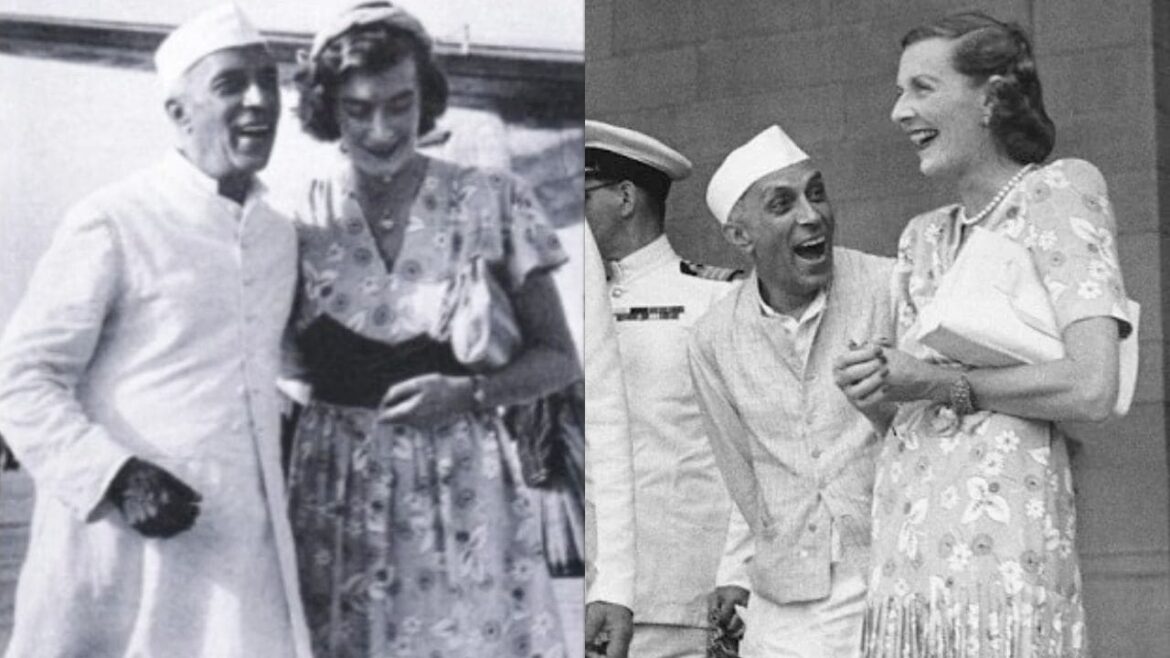Jawaharlal Nehru, India’s first Prime Minister, is widely remembered for his leadership, political vision, and role in shaping modern India. But beyond the political world, he also carried a deeply emotional and human side. One of the most fascinating parts of his personal life is the warm and extraordinary bond he shared with Edwina Mountbatten, the wife of the last British Viceroy of India.
Their connection was subtle, respectful, and rooted in genuine understanding. Even decades later, it continues to raise curiosity and remains one of the most discussed human stories from India’s independence era.
A Connection That Began During India’s Most Turbulent Time
Nehru lost his wife, Kamala Nehru, in 1936—a loss that created a lasting emptiness in his life. More than a decade later, in 1947, Edwina Mountbatten arrived in India with her husband, Lord Louis Mountbatten, who was appointed to oversee India’s final moments under British rule.
This was a time of intense pressure, violence, and historic decisions. During these challenging days, Nehru and Edwina met frequently due to political duties. Slowly, a sincere friendship grew between them—built on empathy, intellectual connection, and emotional comfort.
People around them noticed the warmth between the two, but their bond remained dignified and private.
A Relationship Based on Respect, Not Scandal
Many writers and historians who studied this period have described their bond as one of the closest emotional relationships of Nehru’s life. Edwina, often seen as reserved and introverted, found in Nehru someone she could openly communicate with. Nehru, constantly carrying national responsibility, found in her a rare space of emotional relief.
Pamela Hicks, Edwina’s daughter, mentioned in her memoir that their relationship was deep, but never physical. According to her, both were constantly surrounded by staff and officials, and their closeness was more emotional than romantic.
Their letters, conversations, and shared moments reflected companionship rather than controversy.
Letters That Still Remain Locked Away
After independence, Edwina returned to Britain, but their correspondence continued for years. Nehru wrote to her regularly, and Edwina carefully preserved each letter. These letters are still stored in the Prime Minister’s Memorial Library in New Delhi, sealed as per Indira Gandhi’s instructions in 1971.
Several requests have been made to make these letters public, but they remain locked. This secrecy has only added to the mystery surrounding their relationship, allowing people to imagine different interpretations of their bond.
A Friendship That Outlived Political Borders
Even after her departure, Nehru continued to visit Edwina in Britain. Their families were aware of the relationship, including Lord Mountbatten, who reportedly respected their connection and never objected.
When Edwina passed away in 1960, Nehru was deeply moved. His farewell message highlighted his respect and affection for her. His words revealed what he could not say openly during their lifetime—an acknowledgement of the impact she had on him and on India.
The Photographs That Spark Curiosity Even Today
Photographs of Nehru and Edwina together show them sharing relaxed conversations, smiling at each other, or sitting side by side during official visits. These images are often used to speculate about their relationship, but they also reflect a simple truth:
Two people formed a genuine bond during one of the most chaotic periods in Indian history.
Insights From People Who Witnessed Their Bond
Nehru’s longtime aide, K.F. Rustamji, wrote in his diary that Nehru’s emotional relationships were complex yet grounded in respect. He also mentioned Nehru’s close friendship with Padmaja Naidu, showing that Nehru valued emotional support and intellectual companionship.
Historian Alex von Tunzelmann documented moments of misunderstanding and jealousy between Padmaja and Edwina. But over time, both women reportedly grew to respect and understand each other.
This triangle of personalities shows how human emotions exist even around the most powerful leaders.
A Bond That Still Remains Unfinished in History
Even today, Indians debate what Nehru and Edwina’s relationship really was. Some call it friendship, some label it deep affection, and others see it as a rare connection between two people who understood each other’s loneliness.
But one thing is clear:
Their relationship never influenced political decisions, never caused diplomatic trouble, and never interfered with India’s interest. It simply remained a private chapter in the life of a national leader.
The unanswered questions, sealed letters, and timeless photographs make this story one of the most intriguing personal relationships of India’s freedom era.
Conclusion
Jawaharlal Nehru and Edwina Mountbatten’s bond stands as one of the most meaningful and mysterious human stories in modern Indian history. It was not a love affair born out of scandal, but a respectful connection formed during a dramatic moment in world politics. Their relationship reminds us that even the strongest leaders are human beings with emotions, friendships, and moments of vulnerability.
The sealed letters, preserved memories, and historical accounts keep their story alive—quietly and gracefully—showing that some relationships leave a mark that time cannot erase.
FAQs
Was the relationship between Nehru and Edwina romantic?
There is no confirmed evidence of a romantic or physical relationship. Most accounts describe it as an emotional and intellectual companionship.
Why are their letters sealed?
The letters were sealed by Indira Gandhi in 1971. They remain locked in the Prime Minister’s Memorial Library, possibly to protect personal privacy.
Did Lord Mountbatten know about Nehru and Edwina’s closeness?
Yes. Historical accounts suggest he was fully aware and did not object, as he believed it did not affect personal or political matters.
Did their relationship influence India’s political decisions?
No. Historians widely agree that their bond never interfered with India’s governance or diplomacy.
Why does their relationship still interest people today?
Because it reveals a softer, emotional side of a major world leader and remains surrounded by mystery due to sealed letters and limited information.

